Science and Technology Policy |
Balancing Severe Decision Conflicts under Climate Extremes in Water Resource Management
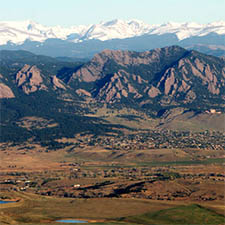 Over the past several years there have been increasing calls for decision support tools in the area of climate and acknowledgement that changing extremes add to an already challenging decision environment for water managers. Recurring droughts, flood events, and concerns over extreme events in the future have created a strong interest among water managers in the Front Range of Colorado about how to plan in the face of these extremes. Traditional methods of identifying alternatives for water supply management may not fully capture the range of existing preferred alternatives, meaning that utilities may miss some of the solutions that appropriately balance among tradeoffs. Read more ... Over the past several years there have been increasing calls for decision support tools in the area of climate and acknowledgement that changing extremes add to an already challenging decision environment for water managers. Recurring droughts, flood events, and concerns over extreme events in the future have created a strong interest among water managers in the Front Range of Colorado about how to plan in the face of these extremes. Traditional methods of identifying alternatives for water supply management may not fully capture the range of existing preferred alternatives, meaning that utilities may miss some of the solutions that appropriately balance among tradeoffs. Read more ...
|
| |
Knowledge, Power and the Coproduction of Climate Information for Adaptation to Climate Change in Tanzania
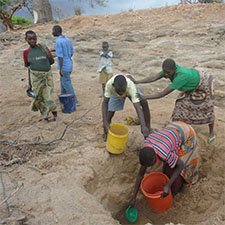 Lisa Dilling, Meaghan Daly, Mara Goldman and Eric Lovell are conducting a project that aims to improve understanding of processes to effectively link climate information and adaptation at national and local scales in Tanzania. The approach is to explicitly recognize and examine the ways in which the varying epistemological traditions and relations of power among vulnerable communities, disaster management professionals, and climate experts influence the perceived value of climate information for improved early warning and climate adaptation. Read more ... Lisa Dilling, Meaghan Daly, Mara Goldman and Eric Lovell are conducting a project that aims to improve understanding of processes to effectively link climate information and adaptation at national and local scales in Tanzania. The approach is to explicitly recognize and examine the ways in which the varying epistemological traditions and relations of power among vulnerable communities, disaster management professionals, and climate experts influence the perceived value of climate information for improved early warning and climate adaptation. Read more ...
|
| |
Emerging Responses to Genetically Modified Crops in Boulder County
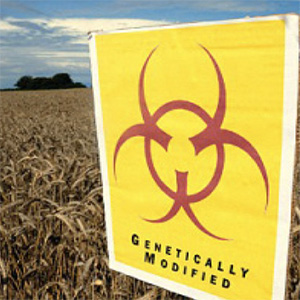 This project was launched to examine the co-evolution of policy making and public perceptions surrounding GM crops in Boulder County. Boulder County is an ideal place to examine the emergence of laws and norms regarding GM technology. In 2016, Boulder County passed a resolution to phase out the use of genetically modified herbicide-resistant crops on county-owned land. his measure effectively banned the use of GM sugar-beets and corn, which were grown on county-owned land at the time that the measure was passed. The Boulder County Cropland Policy allows for the use of new GM crops to be reviewed on a case-by-case basis, and two newly approved crops (potatoes and apples) will likely receive consideration in the coming years. Read more ... This project was launched to examine the co-evolution of policy making and public perceptions surrounding GM crops in Boulder County. Boulder County is an ideal place to examine the emergence of laws and norms regarding GM technology. In 2016, Boulder County passed a resolution to phase out the use of genetically modified herbicide-resistant crops on county-owned land. his measure effectively banned the use of GM sugar-beets and corn, which were grown on county-owned land at the time that the measure was passed. The Boulder County Cropland Policy allows for the use of new GM crops to be reviewed on a case-by-case basis, and two newly approved crops (potatoes and apples) will likely receive consideration in the coming years. Read more ...
|
| |
Building a Network of VAR (Vulnerability, Adaptation, Resilience) Researchers in the Intermountain West
 The intermountain west is home to many researchers who study aspects of climate vulnerability, adaptation and resilience. Most of us attend national conferences such as AAG, AGU, AMS and the like, and many of us work within specialized networks such as fire, water, forest ecosystems, and so on. However, building resilience to climate change is a goal that requires bringing together different perspectives and sectors in order to ensure that system linkages are considered at the regional scale. This project would be the starting point for building a sustained network for resilience that links researchers and practitioners engaged in knowledge-action research across the region. Our goal is to make visible and develop the researcher network that we would then build on in future years to create a more complete practitioner/researcher network for engaged research. Read more ... The intermountain west is home to many researchers who study aspects of climate vulnerability, adaptation and resilience. Most of us attend national conferences such as AAG, AGU, AMS and the like, and many of us work within specialized networks such as fire, water, forest ecosystems, and so on. However, building resilience to climate change is a goal that requires bringing together different perspectives and sectors in order to ensure that system linkages are considered at the regional scale. This project would be the starting point for building a sustained network for resilience that links researchers and practitioners engaged in knowledge-action research across the region. Our goal is to make visible and develop the researcher network that we would then build on in future years to create a more complete practitioner/researcher network for engaged research. Read more ...
|
| |
Innovations in Governance and Sustainability |
Ocean Halos: Marine Zoning in Small-Island Countries
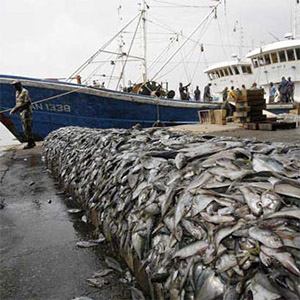 This project examines the accidental subsidies small-island countries provide to foreign fishing fleets, and strategies they may use to recover some of the value, as well as limit the damage to their fish stocks. The territorial waters of small-island countries tend to have less fishing pressure and healthier fish populations than nearby high seas. As a result, fish flow across the territorial boundaries, and foreign fishing effort concentrates near these boundaries, to benefit from the fish spillover. Read more ... This project examines the accidental subsidies small-island countries provide to foreign fishing fleets, and strategies they may use to recover some of the value, as well as limit the damage to their fish stocks. The territorial waters of small-island countries tend to have less fishing pressure and healthier fish populations than nearby high seas. As a result, fish flow across the territorial boundaries, and foreign fishing effort concentrates near these boundaries, to benefit from the fish spillover. Read more ...
|
| |
A "Social-Impact Network" for Wildfire Adaptation
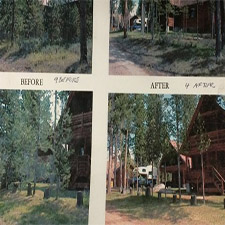 In the face of natural hazards, resource scarcity, climate change, and other social-ecological challenges, how does a community adapt, and how can communities combine forces to contribute to transformational change? Dr Bruce Goldstein, an associate professor in Environmental Design and Environmental Studies and core faculty at the Center for Science and Technology Policy Research (CSTPR) at the University of Colorado Boulder, takes on this pressing question. Read more ... In the face of natural hazards, resource scarcity, climate change, and other social-ecological challenges, how does a community adapt, and how can communities combine forces to contribute to transformational change? Dr Bruce Goldstein, an associate professor in Environmental Design and Environmental Studies and core faculty at the Center for Science and Technology Policy Research (CSTPR) at the University of Colorado Boulder, takes on this pressing question. Read more ...
|
| |
Environmental Rights and Adaptation to Climate Change
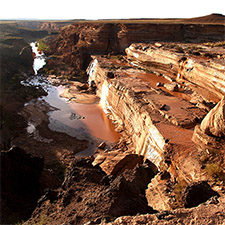 Steve Vanderheiden, who specializes in normative political theory and environmental politics with a particular interest in equity issues, democratic issues, and environmental issues as they pertain to climate change, is exploring what environmental rights should now look like, particularly territorial and water rights. Read more ... Steve Vanderheiden, who specializes in normative political theory and environmental politics with a particular interest in equity issues, democratic issues, and environmental issues as they pertain to climate change, is exploring what environmental rights should now look like, particularly territorial and water rights. Read more ...
|
| |
 STEM Learning Network STEM Learning Network
STEM Education Centers, serve as incubators for transformational changes of higher education practices and culture. By creating and studying a national network of university-based centers of STEM education, we will incubate, support, and leverage key institutional resources – both individual centers and a national network of centers. research on a network of these centers can delineate the potential impacts of the network itself, the nature of such a network, and foundational studies on how such a network is created. These studies will serve to inform the development of the network itself, providing a dynamic, more robust, and more likely-to-be-sustained network. Read more ... |
| |
 Locally Managed Marine Areas Network Locally Managed Marine Areas Network
Natural resource and conservation practitioners are increasingly realizing the importance of having networks of locally managed marine areas (LMMAs). These are areas of ocean managed by local, coastal communities for the protection of fisheries, culture, and biodiversity and have proven effective in reducing local conflicts over fisheries, conserving marine biodiversity and improving catches. Globally, there are number of marine area networks each encompassing a diversity of approaches to coastal management and governance. What is common to LMMA’s, however, is the shared involvement of coastal communities in marine and fisheries management. Read more ... |
| |
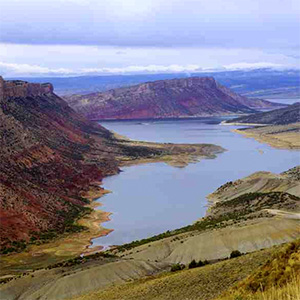 Water Equity Project Workshop Water Equity Project Workshop
This project will seed a research program to be based at CSTPR around equity norms in water governance at multiple scales. The project’s empirical components include the development of new case studies on equity conflicts in water allocation or the transfer of water rights within the Colorado river basin, from archival materials as well as field data collection (interviews, survey research, etc.), and the development of an innovative game-based participatory allocation tool that will allow for collection of data on stakeholder equity preferences. Theories of institutional effectiveness from environmental governance literature anchor the framework, which also relies upon a normative framework for assessing water equity. Expected outputs include publications in interdisciplinary environmental policy and governance journals, a research report designed to inform policymakers and stakeholders, and the public presentation of findings in various fora. Read more ... |
| |
Drivers of Risk Management Decisions |
Advancing the Use of Drought Early Warning Systems in the Upper Colorado River Basin
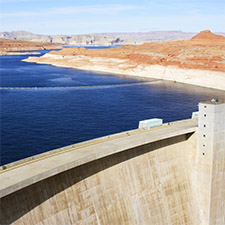 The largely rural Western Slope of Colorado encompasses much of the headwaters of the Colorado River, a critical regional water resource used to meet multiple demands across a landscape that is frequently subject to drought. Water managers and users in this region rely on snowpack as a form of seasonal water storage as well as an indicator of drought. Climate change projections indicate that the regional warming trend will continue, causing the snowpack to melt earlier and produce less runoff for the same precipitation input, and potentially reducing its utility as a drought indicator. Read more ... The largely rural Western Slope of Colorado encompasses much of the headwaters of the Colorado River, a critical regional water resource used to meet multiple demands across a landscape that is frequently subject to drought. Water managers and users in this region rely on snowpack as a form of seasonal water storage as well as an indicator of drought. Climate change projections indicate that the regional warming trend will continue, causing the snowpack to melt earlier and produce less runoff for the same precipitation input, and potentially reducing its utility as a drought indicator. Read more ...
|
| |
Interactions of Drought and Climate Adaptation (IDCA) for Urban Water
 This project, funded by the NOAA Sectoral Applications Research Program (SARP), examined how drought policies interact with both short-term drought and long-term climate change. It asked whether adjustment today or in the past leads to more resilient systems across climate time scales. The project focused on urban water systems across the US and how they responded to drought. Researchers then used a looked for patterns in those responses to understand how such drought policies prepare cities for the adaptation challenge of the future. Read more ... This project, funded by the NOAA Sectoral Applications Research Program (SARP), examined how drought policies interact with both short-term drought and long-term climate change. It asked whether adjustment today or in the past leads to more resilient systems across climate time scales. The project focused on urban water systems across the US and how they responded to drought. Researchers then used a looked for patterns in those responses to understand how such drought policies prepare cities for the adaptation challenge of the future. Read more ...
|
| |
Red Cross/Red Crescent Climate Centre Internship Program
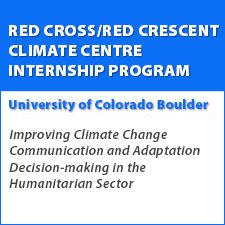 This program seeks to improve climate change communication and adaptation decision-making in response to climate variability and change within the humanitarian sector. It connects humanitarian practitioners from the Red Cross/Red Crescent Climate Centre [RC/RC CC] an affiliate of the International Federation of Red Cross and Red Crescent Societies [IFRC] with science-policy graduate student researchers at the University of Colorado. Read more ... This program seeks to improve climate change communication and adaptation decision-making in response to climate variability and change within the humanitarian sector. It connects humanitarian practitioners from the Red Cross/Red Crescent Climate Centre [RC/RC CC] an affiliate of the International Federation of Red Cross and Red Crescent Societies [IFRC] with science-policy graduate student researchers at the University of Colorado. Read more ...
|
| |
Emerging Responses to Genetically Modified Crops in Boulder County
 This project was launched to examine the co-evolution of policy making and public perceptions surrounding GM crops in Boulder County. Boulder County is an ideal place to examine the emergence of laws and norms regarding GM technology. In 2016, Boulder County passed a resolution to phase out the use of genetically modified herbicide-resistant crops on county-owned land. his measure effectively banned the use of GM sugar-beets and corn, which were grown on county-owned land at the time that the measure was passed. The Boulder County Cropland Policy allows for the use of new GM crops to be reviewed on a case-by-case basis, and two newly approved crops (potatoes and apples) will likely receive consideration in the coming years. Read more ... This project was launched to examine the co-evolution of policy making and public perceptions surrounding GM crops in Boulder County. Boulder County is an ideal place to examine the emergence of laws and norms regarding GM technology. In 2016, Boulder County passed a resolution to phase out the use of genetically modified herbicide-resistant crops on county-owned land. his measure effectively banned the use of GM sugar-beets and corn, which were grown on county-owned land at the time that the measure was passed. The Boulder County Cropland Policy allows for the use of new GM crops to be reviewed on a case-by-case basis, and two newly approved crops (potatoes and apples) will likely receive consideration in the coming years. Read more ...
|
| |
Building a Network of VAR (Vulnerability, Adaptation, Resilience) Researchers in the Intermountain West
 The intermountain west is home to many researchers who study aspects of climate vulnerability, adaptation and resilience. Most of us attend national conferences such as AAG, AGU, AMS and the like, and many of us work within specialized networks such as fire, water, forest ecosystems, and so on. However, building resilience to climate change is a goal that requires bringing together different perspectives and sectors in order to ensure that system linkages are considered at the regional scale. This project would be the starting point for building a sustained network for resilience that links researchers and practitioners engaged in knowledge-action research across the region. Our goal is to make visible and develop the researcher network that we would then build on in future years to create a more complete practitioner/researcher network for engaged research. Read more ... The intermountain west is home to many researchers who study aspects of climate vulnerability, adaptation and resilience. Most of us attend national conferences such as AAG, AGU, AMS and the like, and many of us work within specialized networks such as fire, water, forest ecosystems, and so on. However, building resilience to climate change is a goal that requires bringing together different perspectives and sectors in order to ensure that system linkages are considered at the regional scale. This project would be the starting point for building a sustained network for resilience that links researchers and practitioners engaged in knowledge-action research across the region. Our goal is to make visible and develop the researcher network that we would then build on in future years to create a more complete practitioner/researcher network for engaged research. Read more ...
|
| |
Communication and Societal Change |
Inside the Greenhouse
 Inside the Greenhouse is a collective of professors, students, scholars, practitioners who are committed to creative framing and storytelling of issues surrounding climate change through video, theatre, dance, and writing, to connect a wider audience to the deep and pressing need to address climate change?. Read more ... Inside the Greenhouse is a collective of professors, students, scholars, practitioners who are committed to creative framing and storytelling of issues surrounding climate change through video, theatre, dance, and writing, to connect a wider audience to the deep and pressing need to address climate change?. Read more ...
|
| |
Media and Climate Change Observatory (MeCCO)
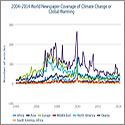 MeCCO monitors 96 sources (across newspapers, radio and TV) in 43 countries in seven different regions around the world. MeCCO assembles the data by accessing archives through the Lexis Nexis, Proquest and Factiva databases via the University of Colorado libraries. These sources are selected through a decision processes involving weighting of three main factors: geographical diversity (favoring a greater geographical range) circulation (favoring higher circulating publications) reliable access to archives over time (favoring those accessible consistently for longer periods of time). Read more ... MeCCO monitors 96 sources (across newspapers, radio and TV) in 43 countries in seven different regions around the world. MeCCO assembles the data by accessing archives through the Lexis Nexis, Proquest and Factiva databases via the University of Colorado libraries. These sources are selected through a decision processes involving weighting of three main factors: geographical diversity (favoring a greater geographical range) circulation (favoring higher circulating publications) reliable access to archives over time (favoring those accessible consistently for longer periods of time). Read more ...
|
| |
Environmental and Science Communication Workshops and Curriculum
 In Summer 2018, four graduate students in ENVS and COMM were funded for part-time research. From this, they created a resource guide of science and environmental communication centers, identifying key documents for public circulation. More rigorously, they identified classes across the university curriculum that might be considered as part of a science and environmental communication undergraduate certificate. From that research, Prof. Pezzullo developed a proposal that has been vetted by administrators, who advised proposing a Minor (or more) in the new College of Media, Communication, and Information. Read more ... In Summer 2018, four graduate students in ENVS and COMM were funded for part-time research. From this, they created a resource guide of science and environmental communication centers, identifying key documents for public circulation. More rigorously, they identified classes across the university curriculum that might be considered as part of a science and environmental communication undergraduate certificate. From that research, Prof. Pezzullo developed a proposal that has been vetted by administrators, who advised proposing a Minor (or more) in the new College of Media, Communication, and Information. Read more ...
|
| |
Cross-Cutting Theme |
ICECaps: International Collective on Environment, Culture & Politics
 Founded in 2012 at the University of Colorado Boulder, the International Collective on Environment, Culture and Politics is a research group that examines some of today’s most pressing environmental issues. ICE CaPs members and affiliates cross disciplines to apply a wide range of theories and perspectives to study issues at the human-environment interface. We work across scales from the individual to the global. Read more ... Founded in 2012 at the University of Colorado Boulder, the International Collective on Environment, Culture and Politics is a research group that examines some of today’s most pressing environmental issues. ICE CaPs members and affiliates cross disciplines to apply a wide range of theories and perspectives to study issues at the human-environment interface. We work across scales from the individual to the global. Read more ...
|
| |
Emerging Responses to Genetically Modified Crops in Boulder County
 This project was launched to examine the co-evolution of policy making and public perceptions surrounding GM crops in Boulder County. Boulder County is an ideal place to examine the emergence of laws and norms regarding GM technology. In 2016, Boulder County passed a resolution to phase out the use of genetically modified herbicide-resistant crops on county-owned land. his measure effectively banned the use of GM sugar-beets and corn, which were grown on county-owned land at the time that the measure was passed. The Boulder County Cropland Policy allows for the use of new GM crops to be reviewed on a case-by-case basis, and two newly approved crops (potatoes and apples) will likely receive consideration in the coming years. Read more ... This project was launched to examine the co-evolution of policy making and public perceptions surrounding GM crops in Boulder County. Boulder County is an ideal place to examine the emergence of laws and norms regarding GM technology. In 2016, Boulder County passed a resolution to phase out the use of genetically modified herbicide-resistant crops on county-owned land. his measure effectively banned the use of GM sugar-beets and corn, which were grown on county-owned land at the time that the measure was passed. The Boulder County Cropland Policy allows for the use of new GM crops to be reviewed on a case-by-case basis, and two newly approved crops (potatoes and apples) will likely receive consideration in the coming years. Read more ...
|
| |
Building a Network of VAR (Vulnerability, Adaptation, Resilience) Researchers in the Intermountain West
 The intermountain west is home to many researchers who study aspects of climate vulnerability, adaptation and resilience. Most of us attend national conferences such as AAG, AGU, AMS and the like, and many of us work within specialized networks such as fire, water, forest ecosystems, and so on. However, building resilience to climate change is a goal that requires bringing together different perspectives and sectors in order to ensure that system linkages are considered at the regional scale. This project would be the starting point for building a sustained network for resilience that links researchers and practitioners engaged in knowledge-action research across the region. Our goal is to make visible and develop the researcher network that we would then build on in future years to create a more complete practitioner/researcher network for engaged research. Read more ... The intermountain west is home to many researchers who study aspects of climate vulnerability, adaptation and resilience. Most of us attend national conferences such as AAG, AGU, AMS and the like, and many of us work within specialized networks such as fire, water, forest ecosystems, and so on. However, building resilience to climate change is a goal that requires bringing together different perspectives and sectors in order to ensure that system linkages are considered at the regional scale. This project would be the starting point for building a sustained network for resilience that links researchers and practitioners engaged in knowledge-action research across the region. Our goal is to make visible and develop the researcher network that we would then build on in future years to create a more complete practitioner/researcher network for engaged research. Read more ...
|

 Over the past several years there have been increasing calls for decision support tools in the area of climate and acknowledgement that changing extremes add to an already challenging decision environment for water managers. Recurring droughts, flood events, and concerns over extreme events in the future have created a strong interest among water managers in the Front Range of Colorado about how to plan in the face of these extremes. Traditional methods of identifying alternatives for water supply management may not fully capture the range of existing preferred alternatives, meaning that utilities may miss some of the solutions that appropriately balance among tradeoffs.
Over the past several years there have been increasing calls for decision support tools in the area of climate and acknowledgement that changing extremes add to an already challenging decision environment for water managers. Recurring droughts, flood events, and concerns over extreme events in the future have created a strong interest among water managers in the Front Range of Colorado about how to plan in the face of these extremes. Traditional methods of identifying alternatives for water supply management may not fully capture the range of existing preferred alternatives, meaning that utilities may miss some of the solutions that appropriately balance among tradeoffs.  Lisa Dilling, Meaghan Daly, Mara Goldman and Eric Lovell are conducting a project that aims to improve understanding of processes to effectively link climate information and adaptation at national and local scales in Tanzania. The approach is to explicitly recognize and examine the ways in which the varying epistemological traditions and relations of power among vulnerable communities, disaster management professionals, and climate experts influence the perceived value of climate information for improved early warning and climate adaptation.
Lisa Dilling, Meaghan Daly, Mara Goldman and Eric Lovell are conducting a project that aims to improve understanding of processes to effectively link climate information and adaptation at national and local scales in Tanzania. The approach is to explicitly recognize and examine the ways in which the varying epistemological traditions and relations of power among vulnerable communities, disaster management professionals, and climate experts influence the perceived value of climate information for improved early warning and climate adaptation.  This project was launched to examine the co-evolution of policy making and public perceptions surrounding GM crops in Boulder County. Boulder County is an ideal place to examine the emergence of laws and norms regarding GM technology. In 2016, Boulder County passed a resolution to phase out the use of genetically modified herbicide-resistant crops on county-owned land. his measure effectively banned the use of GM sugar-beets and corn, which were grown on county-owned land at the time that the measure was passed. The Boulder County Cropland Policy allows for the use of new GM crops to be reviewed on a case-by-case basis, and two newly approved crops (potatoes and apples) will likely receive consideration in the coming years.
This project was launched to examine the co-evolution of policy making and public perceptions surrounding GM crops in Boulder County. Boulder County is an ideal place to examine the emergence of laws and norms regarding GM technology. In 2016, Boulder County passed a resolution to phase out the use of genetically modified herbicide-resistant crops on county-owned land. his measure effectively banned the use of GM sugar-beets and corn, which were grown on county-owned land at the time that the measure was passed. The Boulder County Cropland Policy allows for the use of new GM crops to be reviewed on a case-by-case basis, and two newly approved crops (potatoes and apples) will likely receive consideration in the coming years.  The intermountain west is home to many researchers who study aspects of climate vulnerability, adaptation and resilience. Most of us attend national conferences such as AAG, AGU, AMS and the like, and many of us work within specialized networks such as fire, water, forest ecosystems, and so on. However, building resilience to climate change is a goal that requires bringing together different perspectives and sectors in order to ensure that system linkages are considered at the regional scale. This project would be the starting point for building a sustained network for resilience that links researchers and practitioners engaged in knowledge-action research across the region. Our goal is to make visible and develop the researcher network that we would then build on in future years to create a more complete practitioner/researcher network for engaged research.
The intermountain west is home to many researchers who study aspects of climate vulnerability, adaptation and resilience. Most of us attend national conferences such as AAG, AGU, AMS and the like, and many of us work within specialized networks such as fire, water, forest ecosystems, and so on. However, building resilience to climate change is a goal that requires bringing together different perspectives and sectors in order to ensure that system linkages are considered at the regional scale. This project would be the starting point for building a sustained network for resilience that links researchers and practitioners engaged in knowledge-action research across the region. Our goal is to make visible and develop the researcher network that we would then build on in future years to create a more complete practitioner/researcher network for engaged research.  This project examines the accidental subsidies small-island countries provide to foreign fishing fleets, and strategies they may use to recover some of the value, as well as limit the damage to their fish stocks. The territorial waters of small-island countries tend to have less fishing pressure and healthier fish populations than nearby high seas. As a result, fish flow across the territorial boundaries, and foreign fishing effort concentrates near these boundaries, to benefit from the fish spillover.
This project examines the accidental subsidies small-island countries provide to foreign fishing fleets, and strategies they may use to recover some of the value, as well as limit the damage to their fish stocks. The territorial waters of small-island countries tend to have less fishing pressure and healthier fish populations than nearby high seas. As a result, fish flow across the territorial boundaries, and foreign fishing effort concentrates near these boundaries, to benefit from the fish spillover.  In the face of natural hazards, resource scarcity, climate change, and other social-ecological challenges, how does a community adapt, and how can communities combine forces to contribute to transformational change? Dr Bruce Goldstein, an associate professor in Environmental Design and Environmental Studies and core faculty at the Center for Science and Technology Policy Research (CSTPR) at the University of Colorado Boulder, takes on this pressing question.
In the face of natural hazards, resource scarcity, climate change, and other social-ecological challenges, how does a community adapt, and how can communities combine forces to contribute to transformational change? Dr Bruce Goldstein, an associate professor in Environmental Design and Environmental Studies and core faculty at the Center for Science and Technology Policy Research (CSTPR) at the University of Colorado Boulder, takes on this pressing question.  Steve Vanderheiden, who specializes in normative political theory and environmental politics with a particular interest in equity issues, democratic issues, and environmental issues as they pertain to climate change, is exploring what environmental rights should now look like, particularly territorial and water rights.
Steve Vanderheiden, who specializes in normative political theory and environmental politics with a particular interest in equity issues, democratic issues, and environmental issues as they pertain to climate change, is exploring what environmental rights should now look like, particularly territorial and water rights.  STEM Learning Network
STEM Learning Network Locally Managed Marine Areas Network
Locally Managed Marine Areas Network Water Equity Project Workshop
Water Equity Project Workshop The largely rural Western Slope of Colorado encompasses much of the headwaters of the Colorado River, a critical regional water resource used to meet multiple demands across a landscape that is frequently subject to drought. Water managers and users in this region rely on snowpack as a form of seasonal water storage as well as an indicator of drought. Climate change projections indicate that the regional warming trend will continue, causing the snowpack to melt earlier and produce less runoff for the same precipitation input, and potentially reducing its utility as a drought indicator.
The largely rural Western Slope of Colorado encompasses much of the headwaters of the Colorado River, a critical regional water resource used to meet multiple demands across a landscape that is frequently subject to drought. Water managers and users in this region rely on snowpack as a form of seasonal water storage as well as an indicator of drought. Climate change projections indicate that the regional warming trend will continue, causing the snowpack to melt earlier and produce less runoff for the same precipitation input, and potentially reducing its utility as a drought indicator.  This project, funded by the NOAA Sectoral Applications Research Program (SARP), examined how drought policies interact with both short-term drought and long-term climate change. It asked whether adjustment today or in the past leads to more resilient systems across climate time scales. The project focused on urban water systems across the US and how they responded to drought. Researchers then used a looked for patterns in those responses to understand how such drought policies prepare cities for the adaptation challenge of the future.
This project, funded by the NOAA Sectoral Applications Research Program (SARP), examined how drought policies interact with both short-term drought and long-term climate change. It asked whether adjustment today or in the past leads to more resilient systems across climate time scales. The project focused on urban water systems across the US and how they responded to drought. Researchers then used a looked for patterns in those responses to understand how such drought policies prepare cities for the adaptation challenge of the future.  This program seeks to improve climate change communication and adaptation decision-making in response to climate variability and change within the humanitarian sector. It connects humanitarian practitioners from the Red Cross/Red Crescent Climate Centre [RC/RC CC] an affiliate of the International Federation of Red Cross and Red Crescent Societies [IFRC] with science-policy graduate student researchers at the University of Colorado.
This program seeks to improve climate change communication and adaptation decision-making in response to climate variability and change within the humanitarian sector. It connects humanitarian practitioners from the Red Cross/Red Crescent Climate Centre [RC/RC CC] an affiliate of the International Federation of Red Cross and Red Crescent Societies [IFRC] with science-policy graduate student researchers at the University of Colorado.  Inside the Greenhouse is a collective of professors, students, scholars, practitioners who are committed to creative framing and storytelling of issues surrounding climate change through video, theatre, dance, and writing, to connect a wider audience to the deep and pressing need to address climate change?.
Inside the Greenhouse is a collective of professors, students, scholars, practitioners who are committed to creative framing and storytelling of issues surrounding climate change through video, theatre, dance, and writing, to connect a wider audience to the deep and pressing need to address climate change?. 
 In Summer 2018, four graduate students in ENVS and COMM were funded for part-time research. From this, they created a resource guide of science and environmental communication centers, identifying key documents for public circulation. More rigorously, they identified classes across the university curriculum that might be considered as part of a science and environmental communication undergraduate certificate. From that research, Prof. Pezzullo developed a proposal that has been vetted by administrators, who advised proposing a Minor (or more) in the new College of Media, Communication, and Information.
In Summer 2018, four graduate students in ENVS and COMM were funded for part-time research. From this, they created a resource guide of science and environmental communication centers, identifying key documents for public circulation. More rigorously, they identified classes across the university curriculum that might be considered as part of a science and environmental communication undergraduate certificate. From that research, Prof. Pezzullo developed a proposal that has been vetted by administrators, who advised proposing a Minor (or more) in the new College of Media, Communication, and Information.  Founded in 2012 at the University of Colorado Boulder, the International Collective on Environment, Culture and Politics is a research group that examines some of today’s most pressing environmental issues. ICE CaPs members and affiliates cross disciplines to apply a wide range of theories and perspectives to study issues at the human-environment interface. We work across scales from the individual to the global.
Founded in 2012 at the University of Colorado Boulder, the International Collective on Environment, Culture and Politics is a research group that examines some of today’s most pressing environmental issues. ICE CaPs members and affiliates cross disciplines to apply a wide range of theories and perspectives to study issues at the human-environment interface. We work across scales from the individual to the global.